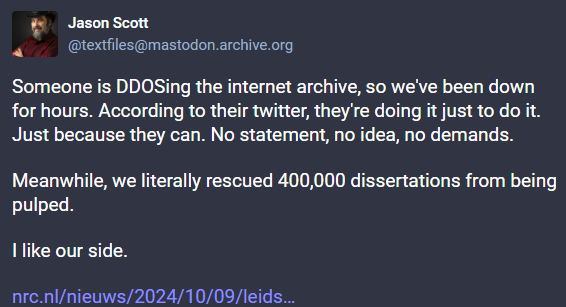Internet Archive Data Breach Exposes 31 Million Users
A significant data breach at the Internet Archive exposes 31 million user accounts, raising critical questions about digital security and preservation efforts.

Key Points
- The Internet Archive
suffered a significant cybersecurity breach, exposing the personal data of 31 million users, including usernames and encrypted passwords.
- This breach underscores the importance of using unique, strong passwords to mitigate risks across multiple online platforms.
- In response, the Internet Archive is implementing enhanced security measures to safeguard its digital preservation efforts and restore user trust.
The Internet Archive, an invaluable digital library that houses millions of web pages, books, and cultural artifacts, has recently experienced a significant cybersecurity breach. Confirmed by its founder,
, the breach has exposed the personal data of 31 million users, shaking the confidence of many who rely on this platform for free access to historical digital content. The breach not only includes usernames and email addresses but also encrypted passwords, a predicament that raises questions about digital security habits and the integrity of online archiving resources.

The Breach Explained
On October 9th, users visiting the Internet Archive were met with a startling JavaScript pop-up message stating, “Have you ever felt like the Internet Archive runs on sticks and is constantly on the verge of suffering a catastrophic security breach? It just happened. See 31 million of you on HIBP!” This shocking announcement was indicative of not only a data breach but also ongoing distributed denial-of-service (DDoS) attacks on the platform. This combination of attacks illustrates the vulnerability that even the largest digital repositories face in our increasingly interconnected world.
The hackers behind this breach, identified as a pro-Palestinian group dubbed SN_Blackmeta, claimed responsibility for the DDoS attacks but have not been directly linked to the actual data theft.
of Have I Been Pwned (HIBP) confirmed that the hack resulted in the unauthorized access to a database containing substantial user information, which is alarming considering that many individuals use the same passwords across different platforms. This incident serves as a poignant reminder of the importance of unique, strong passwords.
The Significance of the Internet Archive
Founded in 1996, the Internet Archive serves as a critical resource in preserving digital history. Its
feature allows users to view snapshots of web pages from different times, providing invaluable support for researchers, journalists, and the general public in confirming sources and preserving evidence that may otherwise be lost. The implications of such a breach extend beyond individual privacy; they threaten the very core of this preservation mission.
According to reports, over 54% of the exposed accounts were previously compromised in other data breaches, highlighting a concerning trend: many users do not prioritize password uniqueness and strong security measures. This poses a significant risk not only to their Internet Archive accounts but also to any other accounts sharing the same login details. Experts recommend adopting password managers to ensure unique, strong passwords across multiple platforms, thus reducing the risk of future breaches.
What the Future Holds
The Internet Archive is currently taking measures to combat this attack actively. Brewster Kahle stated that the organization is working to enhance security protocols and restore services as quickly as possible. However, this incident highlights the real challenges that digital archival institutions face concerning cybersecurity. As cyber threats grow in sophistication, organizations must also evolve their strategies to protect against such breaches.
Further reinforcing this, Kahle reported in a public update, “What we’ve done: Disabled the JS library, scrubbing systems, upgrading security”. These measures indicate a proactive approach to mitigate the threats posed not only by hackers but also by ongoing DDoS attacks that aim to disrupt services critical to maintaining public access to knowledge.
Broader Implications for Cybersecurity
This breach signifies a larger issue confronting online platforms, especially those handling vast amounts of user data. It calls into question the adequacy of cybersecurity infrastructure at charitable organizations that prioritize access and preservation over stringent security. As attacks grow more prevalent, the need for improved cybersecurity practices becomes ever more apparent.
While the Internet Archive grapples with the ramifications of this incident, it serves as a cautionary tale for all digital platforms. Users must remain vigilant about their online security practices, utilizing tools like HIBP to stay informed about potential risks to their data.
This incident is a stark reminder that the digital world, while a repository of human knowledge and history, is also fraught with dangers. Prioritizing security is not just a best practice; it is a necessity in preserving the integrity of our digital future.


